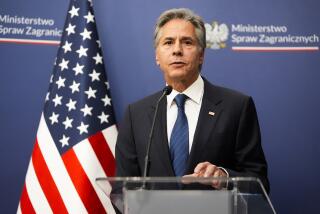Soviet-Style Siege on the Media
- Share via
Frustrated by the laggard pace and high cost of their conflict in Chechnya and resentful of journalists whose reports contradict official propaganda, Russian officials are stepping up their harassment of the independent media. The most flagrant case involves Andrei Babitsky, a Russian citizen who is a correspondent for the American-funded Radio Liberty.
Babitsky’s broadcasts from Chechnya often departed from the official Russian line and angered the military. In mid-January he was arrested. A few days ago Moscow claimed he had been handed over to Chechen rebels in exchange for three captured Russian soldiers. An unconvincing videotape supposedly documents the exchange, which the Chechens say they know nothing about. Despite Kremlin assertions Tuesday that he is “alive and healthy,” there is widespread concern that he has been murdered by the Russian military.
Other reporters have been victims of official ire. Some have been detained, questioned, in several cases accused of spying. At least one gadfly journalist who has been critical of high officials was ordered by the Federal Security Service, a successor to the KGB, to report for psychiatric evaluation at a clinic more than 100 miles from his Moscow home. This is an undisguised throwback to the Soviet era, when dissidents were often locked up and forcibly given mind-altering drugs. The rationale for this perversion of medical ethics was that anyone bold enough to criticize the system had to be mentally unbalanced.
The message going out to the media is clear: Venture too far from the official story and harsh consequences could follow. The government has the power to compel greater media conformity, by targeting individual journalists or by imposing crippling fees and taxes on their employers. This is not direct censorship, but it is censorship by coercion, and it is a blow to Russia’s shallowly rooted democracy. The authoritarian mind-set clearly did not die with the Soviet Union. In the new Russia it remains a dangerous presence.
More to Read
Sign up for Essential California
The most important California stories and recommendations in your inbox every morning.
You may occasionally receive promotional content from the Los Angeles Times.













